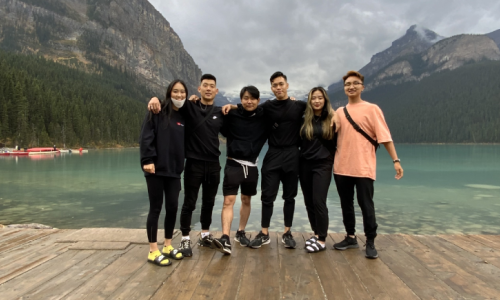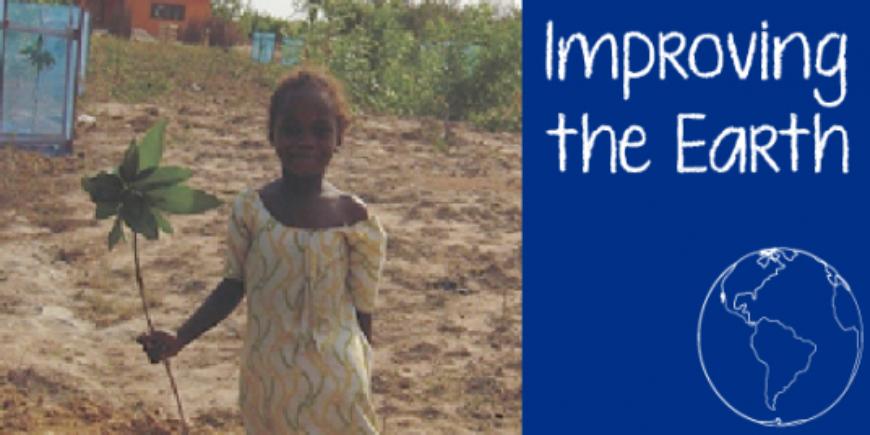
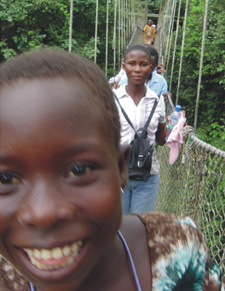
Neil Nunn, a third year Geography student specializing in environmental studies is passionate about environmental, developmental and social justice issues. In this article, the third of a series, Neil helps the school reduce deforestation and shares his co-op adventures at a community school in Ghana.
Today I have celebrated my three week Ghanian birthday and I can hardly believe that I have completed my third week of teaching. It has been going very well. I am learning how to manage the children better each day and overcoming the barrier created from my accent and the students lacking the ability to speak English very well. Teaching has become routine and feels like 9 to 5 job. I have been looking forward to the weekends and not wanting to wake up in the mornings but still get a lot of joy from working with these children. Being a Geographer, I was quite troubled to discover that many of the children thought that Britain was a neighbouring country to Ghana and that ‘Europa’, Asia and Australia were countries in Africa. Last week, we spent some time learning about the neighbouring countries of Ghana and different countries and lakes in Africa.
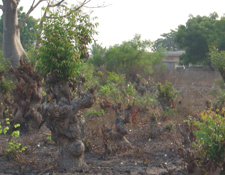
The tree planting project has begun, last week, the school children were told to bring sticks, buckets and tools from home to build the goat proof fencing. During school hours the small children made several trips to the local cow farms and created a big pile of cow dung while the larger children dug holes. So far, we have dug holes for ten palm trees. The hole digging has proved to be more difficult than anticipated. Previously when I had heard about ‘hard pan’ laterized clay soils being like cement I never believed it. However, as I discovered it was like cement. The holes have been dug knee deep and about two feet wide and then filled with manure to promote strong growth of the roots giving them the ability to penetrate the laterized soils.
Although during these efforts, I have realized a need of the school that has posed a bit conflict of interest to the efforts at hand.
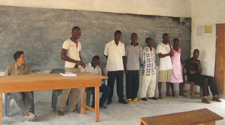
Initially, my intentions for creating a tree planting project were: to regulate the climate, recycle air, balance the 'whack' carbon cycle, sustain the people with the fruit the tree bares, reduce soil erosion, provide habitat for living organisms and whatever eco-services a forest gives to the environment. I have realized many challenges and conflicts have arisen.
About a year ago, there was a volunteer teacher in Sega, Miss Penny, from Australia. Like most volunteers, Miss Penny was touched by the community in Sega, and kept in close touch with the school. Recently a violent fire had been burning towards Penny's grandfather’s house in Australia. Penny notified Mr. Godwin of the crisis. Ghana is a faithful Christian country and as a result, Mr. Godwin, the teachers and the children from the school were 'prayer warriors', praying hard and often for Penny’s grandfather and his home. There was a sudden change in the direction of the wind which stopped the 'rager' less than a kilometer from Penny’s grandfather’s house saving the house.
Coincidentally, during the same period Penny's father won a poetry contest and was awarded $1000Aus and was inspired to donate this money to the school. The money was used to build a new school kitchen. The current kitchen is made out of grass and clay and in such a state of disrepair that one heavy rain and would completely destroy it. The kitchen exists to ensure the children receive one healthy meal a day. Feeding fees are about 15 cents a day and is collected from the children. Two women cook the meals and use wood on an open stove everyday to cook rice and stew. Even though this new kitchen is being built they intended to continue to cook on an open fire, fuelled by wood.
In the developing world, specifically Africa, the greatest environmental problem that occurs symbiotically with population growth is deforestation. Deforestation results in desertification, the transformation of forested land into desert-like unproductive land caused by the removal of vegetation. The largest factor that results in this crisis is what is known as 'the fuelwood crisis'. It is important to know that in city slums and rural villages the only means to cook food is by burning wood which is gathered from the nearest forested area. In Ougadougou, the capital of Burkina Faso, in 1996 there was not one tree existing within a 90km ring around the city!
I realized that my efforts would be counter productive to supply time and money into planting trees while there was a need to stop deforestation. I donated $200-$300 to purchase two gas burners and some large propane cylinders to use in the new kitchen which has slowed down the reforestation a little. Naturally, gas is a much more efficient supply of energy to cook food and I am very happy that the lunch ladies will no longer be subjected to working all day in a 'hot boxed' smokey mud hut.
Today, Mr. Godwin and I were in Tema to buy the cylinders and the burners for the school. I am very happy with this contribution as it will be much more cost effective for the school and reap immediate local impact. I can’t wait to see the look on our neighbour Happy’s (one of the lunch ladies) face when she actually sees the equipment. They were told that a new stove and burner were to be purchased but didn’t believe it could be true.












